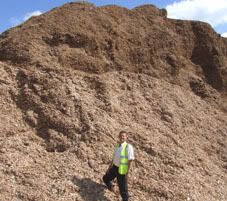British recycling company to export wood chips to Germany for bioenergy
 A huge mountain of wood chippings from Dorset, in the UK, is to be shipped to mainland Europe where it will be used to provide energy to power homes and businesses in Germany. Work on moving the 2,000 tonnes of chippings from Eco Composting’s 13-acre site at Parley, on the outskirts of Bournemouth International Airport, got underway this week.
A huge mountain of wood chippings from Dorset, in the UK, is to be shipped to mainland Europe where it will be used to provide energy to power homes and businesses in Germany. Work on moving the 2,000 tonnes of chippings from Eco Composting’s 13-acre site at Parley, on the outskirts of Bournemouth International Airport, got underway this week.The company chose to export the biomass rather than sending it to landfill, after its customer, chipboard manufacturer Kronanspan, in north Wales, raised the material quality specification meaning that recycled wood from civic amenity sites can not be used to make chipboard. Record electricity and fossil fuel prices (including coal) and efficient, dedicated biomass power plants in Europe make the trade of such 'opportunity fuels' feasible.
Waste management specialist SITA UK has worked closely with Eco Composting, its sub-contractor, and Gloucestershire-based company Boomeco to find a ‘green friendly’ solution for the disposal of the wood. The wood comes from household recycling centres across Dorset which are operated by SITA UK on behalf of local councils.
The chippings, equivalent to about 100 truckloads, are being taken to Southampton Docks ready for shipment to Europe. On arrival in Germany the wood will be transferred to a biomass plant in the north of the country for burning, generating electricity for homes and businesses.
SITA UK, Eco and Boomeco have worked hard on finding a safe and environmentally friendly solution to the disposal of this wood. It’s good news that it will be used to provide clean and green energy for homes and businesses. Of course, it would be even better news if the wood chippings were to remain on our site and used to provide power for Dorset homes. To date, our plans have met with great support and we’re hopeful planning permission will be granted. - Andy Hill, Eco’s Sales and Marketing DirectorBiomass plants were highlighted in last year’s Stern Report on Global Warming as a way of tackling climate change. They burn wood products but in a way that is carbon neutral and, therefore, does not contribute towards global warming.
Eco Composting has officially submitted a planning application to build its own £7 million biomass plant on its existing composting and wood recycling site at Parley. If approved it would be one of the first facilities of its type in the UK. The 25,000 tonne capacity facility would be capable of generating 2.7MW of electricity a year. The electricity would be sent to the national grid at nearby Redhill and be enough to power about 5,000 local homes:
 energy :: sustainability :: biomass :: bioenergy :: biofuels :: wood chips :: fossil fuels :: biomass trade :: UK :: Germany ::
energy :: sustainability :: biomass :: bioenergy :: biofuels :: wood chips :: fossil fuels :: biomass trade :: UK :: Germany :: Currently there is only one other biomass plant operating in the UK although a number are in the pipeline and they have been operating in Europe for five years. According to Hill, they not only make environmental, but economic, sense.
Eco estimate that the wood chippings being shipped to Germany would provide power for about 5,000 homes for six weeks. If permission is granted, Eco’s biomass plant could be up and running by 2009.
Eco Composting is one of the UK’s leading organics recycling firms, annually processing 120,000 tonnes of material on its 14-acre site at Parley, Dorset. End products include turf, enriched topsoil, compost and woodchip. Eco employs 29 staff and recorded a £3.5m turnover in the year to December 31, 2006.
Biomass trade is growing rapidly and is moving beyond regional borders. Spot coal prices have reached all time records in Europe, at over US$100 per tonne (CIF), whereas carbon prices have remained firm. This has prompted some major power companies to import biofuels from other countries. Recently, Dutch power company Essent started importing coffee husks from Brazil, to be used for co-firing at one of its coal plants. It has contracted to import 5,000 tons in a first stage, with an option to purchase a second load of 20,000 tonnes.
Depending on their bulk density, biomass residues from agriculture, forestry and industry can be shipped over long distances competitively. However, freight prices have increased considerably over the past years.
Picture: Andy Hill, Eco’s Sales and Marketing Director, with some of the wood chippings which are bound for Germany. Credit: Eco Composting.
 --------------
--------------
 PolyOne Corporation, the US supplier of specialised polymer materials, has opened a new colour concentrates manufacturing plant in Kutno, Poland. Located in central Poland, the new plant will produce colour products in the first instance, although the company says the facility can be expanded to handle other products. In March, the Ohio-based firm launched a range of of liquid colourants for use in bioplastics in biodegradable applications. The concentrates are European food contact compliant and can be used in polylactic acid (PLA) or starch-based blends.
PolyOne Corporation, the US supplier of specialised polymer materials, has opened a new colour concentrates manufacturing plant in Kutno, Poland. Located in central Poland, the new plant will produce colour products in the first instance, although the company says the facility can be expanded to handle other products. In March, the Ohio-based firm launched a range of of liquid colourants for use in bioplastics in biodegradable applications. The concentrates are European food contact compliant and can be used in polylactic acid (PLA) or starch-based blends.








0 Comments:
Post a Comment
Links to this post:
Create a Link
<< Home